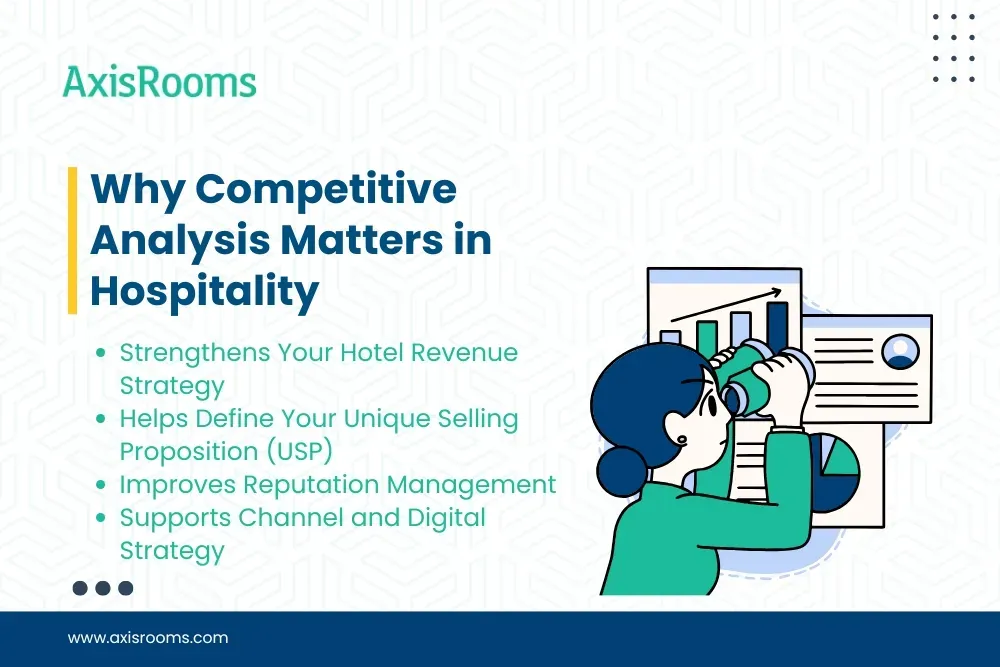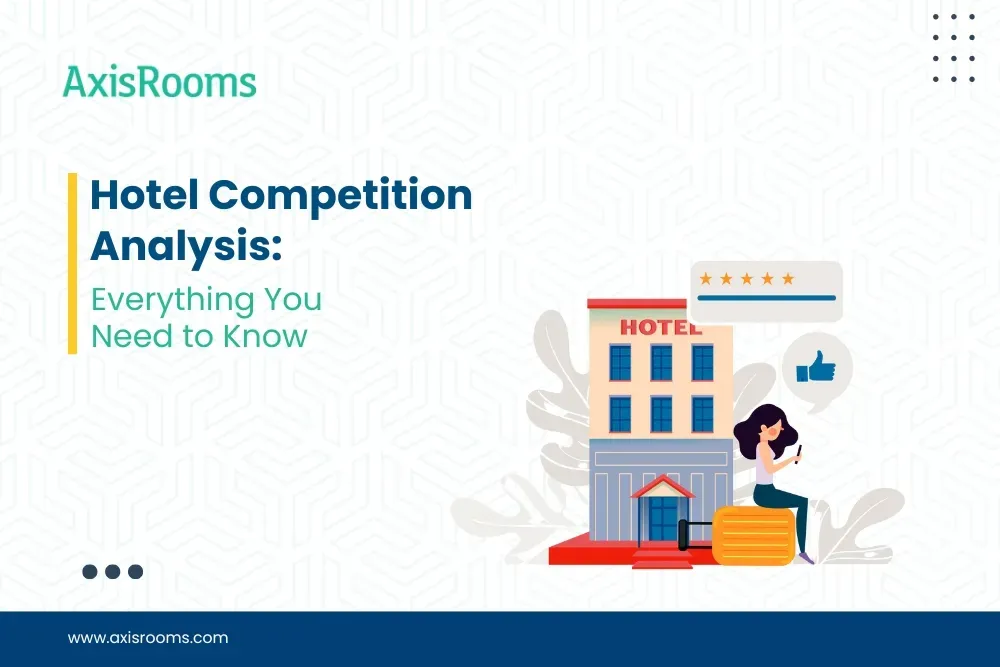What is Hotel Competition Analysis?
Hotel competition analysis is the process of evaluating rival properties within your target market to understand how your hotel performs in comparison. This involves analyzing pricing, amenities, guest reviews, service quality, and digital visibility.
Rather than relying on assumptions, competition analysis provides clarity on where your property stands — and where opportunities lie.
Why Competitive Analysis Matters in Hospitality

Strengthens Your Hotel Revenue Strategy
Competitive insights inform pricing models, room packaging, and promotions. Hotels that actively monitor their competitors can create more dynamic and profitable Hotel Revenue Strategies.
Helps Define Your Unique Selling Proposition (USP)
Do your competitors lack sustainable hotel amenities? Are they ignoring family packages or pet-friendly stays? Spot the gaps and position your property with a clear, differentiated offering.
Improves Reputation Management
Understanding what guests love (or dislike) about your competitors helps shape your own service delivery. Online reviews, ratings, and reputation directly influence conversion rates.
Supports Channel and Digital Strategy
Knowing which OTAs or direct channels are yielding high visibility for competitors helps you refine your own distribution and Hotel Marketing Strategy to increase conversions.
How to Conduct Accurate Hotel Competition Analysis
1. Start with a Hotel SWOT Analysis
A SWOT analysis gives you clarity on how to capitalize on your strengths while preparing for competitive threats.
2. Define Your True Competitors
Look beyond star ratings. Compare hotels based on:
- Location proximity (2–5 km radius)
- Room category and nightly rates
- Guest type (business, couples, families)
- Channel usage (direct bookings, OTAs, metasearch)
With the hospitality industry’s global market growing to an impressive $4.9 trillion in 2024 and contributing a record $11.1 trillion to global GDP (10% of the total), competition has never been fiercer.
3. Assess Their Digital Footprint
Examine competitor websites and booking platforms:
- Is the website mobile-optimized?
- Do they offer discounts or loyalty pricing?
- Are they using a web booking engine?
Also review their Google Business Profile, social media, and third-party review sites. These are often overlooked but highly influential.
4. Monitor Online Sentiment
Reputation Management includes tracking:
- Guest ratings across platforms
- Response time and tone on reviews
- Volume and quality of positive vs negative feedback
Understanding how guests perceive your competitors helps you position your service better.
5. Study Competitor Pricing Tactics
Use rate parity tools or OTA comparisons to analyze:
- Room-only vs package rates
- Seasonal pricing changes
- Weekend/weekday rate differences
Example: If your competitor drops prices by 15% every Thursday, you may consider a mid-week promo or loyalty add-on to stay competitive without cutting margins.
Key Metrics and Tools to Track
Tools you can use:
- Google Alerts for brand monitoring
- OTA Insight or RateTiger for price tracking
- ReviewPro or TrustYou for sentiment analysis
- AxisRooms Channel Manager for rate management
Real-World Examples from Independent Hotels
Example 1: A boutique hotel in Goa noticed its competitor offered free airport transfers. After adding this service as part of their premium suite package, their weekend occupancy rose by 12%.
Example 2: A mid-sized business hotel in Jaipur used competitor review tracking to identify that most complaints revolved around breakfast quality. They optimized their own F&B offerings and began promoting it through user-generated content, driving a 25% increase in direct bookings.
Example 3: Data-Driven Success
A luxury resort in Mumbai implemented a data-driven business model in early 2025, following the example of industry leaders. By leveraging machine learning algorithms to analyze real-time competitor data, they could automatically respond to market changes, optimizing their rates daily based on competitor pricing. The result? A 15% increase in RevPAR within just three months, significantly outperforming the luxury segment’s average growth of 4.2%.
These examples reflect how even small insights can translate into significant performance improvements.
How AxisRooms Helps Hoteliers Stay Ahead
AxisRooms offers intelligent tools tailored for hospitality businesses that want to act on competition data.
Pricing Intelligence Tools
AxisRooms enables dynamic pricing based on real-time market demand, competitor rates, and booking windows — ensuring you never undersell during peak demand.
Online Reputation Tracking
Track reviews and ratings against competitors, respond to guest feedback faster, and gain insight into guest sentiment trends.
Centralized Channel Management
Manage OTA listings, pricing, and inventory from a single dashboard. Improve visibility, avoid overbookings, and ensure consistent rates across platforms.
Web Booking Engine
Convert direct traffic into bookings with a customizable, commission-free booking engine. AxisRooms also supports mobile bookings and upsell offers during the reservation process.
Content and Brand Optimization
Update website content and images, improve SEO, and ensure your digital assets reflect your brand's value proposition better than the competition.
Final Thoughts
A proper hotel competition analysis is no longer optional — it's foundational to smart decision-making. Whether you're operating a luxury resort, a boutique guesthouse, or a business hotel, understanding your competitors will help you position your brand more effectively.
With AxisRooms, you get the tools, insights, and automation needed to act on those insights — from revenue strategy to reputation management.
Want to outperform your competition this season?
Visit www.axisrooms.com to explore our hotel solutions today.


